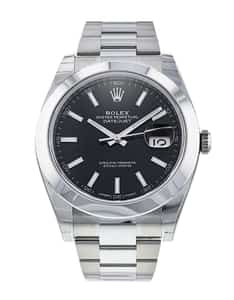Pre-Owned Rolex Watches
Established 1905Famed for iconic models such as the Sea-Dweller, GMT-Master and the Daytona, Rolex watches have become synonymous with luxury horology. Founded in 1905 by watchmaker Hans Wilsdorf, the brand achieved innovations such as the world's first waterproof watch, and continues to lead the industry to this day.
View AllRolex History
Stop anyone on the street and ask them to name a luxury brand, and Rolex will often be your answer. The level of recognition the brand possesses was not earned overnight—it is the product of over a century of dedication and skill. Formed in London in 1905 by watchmaker Hans Wilsdorf, the manufacturer has since scaled not only the ever-growing peaks of technological advancement, but also peaks of a much more geological nature, too. With the Deepsea Special plumbing the depths of the Mariana Trench, the Explorer climbing through the thin atmosphere of Mount Everest’s peak, and the GMT-Master floating in the zero gravity of space, Rolex watches have been in just about every hostile environment imaginable. Where precision and robustness are required, you need look no further. The brand’s fastidious nature to perform better than its competitors started in 1910, when one of its watches became the first ever to receive the Swiss Certificate of Precision. Then, four years later, it was awarded a class ‘A’ precision certificate from Kew Observatory, an award that was previously reserved only for marine chronometers. The innovative brand’s achievements continued, when in 1927, Mercedes Gleitze swam the English Channel wearing the world’s first waterproof watch, the Oyster. With new features such as a screw-down crown and a precision milled crystal, it pioneered the modern diving watch. As Mercedes emerged from the freezing waters, so too did the Oyster, and in perfect working order. The publicity that followed launched Rolex watches to dizzying heights. In 1931, the self-winding Perpetual movement was patented, a simple yet ingenious design that continues to power every automatic watch to this day. Previous designs by other manufacturers had proven to be too awkward, too clumsy, or just plain unreliable. The Perpetual movement solved these problems while also producing longer power reserves and more accurate timing. Utilising a system of ratchets, clutches and an oscillating weight with the ability to rotate a full 360 degrees, the Perpetual had the ability to wind itself with the wearer’s movements. Staying ever ahead of the game, Rolex invented the self-changing date for its 1945 Datejust, onto which a self-changing day was added in 1956 to make the Day-Date. As well as stretching the boundaries of innovation, Rolex watches also push the envelope when it comes to real world testing. In 1960, just seven years after the launch of the iconic Submariner watch, Jacques Piccard travelled 35,814 feet to the bottom of the Mariana Trench with a prototype Deepsea Special. It was strapped to the outside of his bathyscaphe, and it survived. If that wasn’t proof enough of the rugged endurance of the brand’s watches, Sherpa guide Tenzing Norgay exposed his Explorer to the bitter winds and freezing storms of the 1953 expedition to conquer the peak of Everest for the very first time. A GMT-Master was even taken to the moon by John ‘Jack’ Swigert on the Apollo 14 mission. But Rolex watches aren’t just for those exploring the most dangerous corners of our cosmos—they are for professionals, too. In 1955, the manufacturer developed the twin time zone GMT-Master for Pan Am, whose flights were carrying passengers further around the world than ever before. Then, in 1956, CERN scientists were finally able to use a watch in the electro-magnetic fields produced by their equipment as the brand had created the Milgauss, a watch capable of withstanding such forces. 1963 saw the birth of the Cosmograph Daytona, a chronograph watch with racing drivers in mind. Dangerous exploration met professional employment in 1967 when the brand developed the Sea-Dweller for COMEX, a diving agency dedicated to saturation diving. In addition to its Professional collection, the elite manufacturer also makes watches with a more aesthetic leaning, such as the Yacht-Master, the Pearlmaster and the Cellini. These watches may have extra adornments, but they lose nothing of the functionality that the brand is famous for. The recently introduced Sky-Dweller is a testament to this, as a watch that is both pleasingly attractive and superlatively clever. Rolex is more than just a high-street fashion name. It produces beautiful luxury watches, but it also commands a pedigree that can only be dreamed of by other manufacturers. It is, was, and always will be iconic.












































































































































































